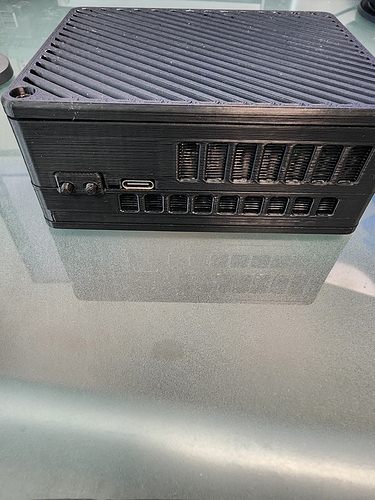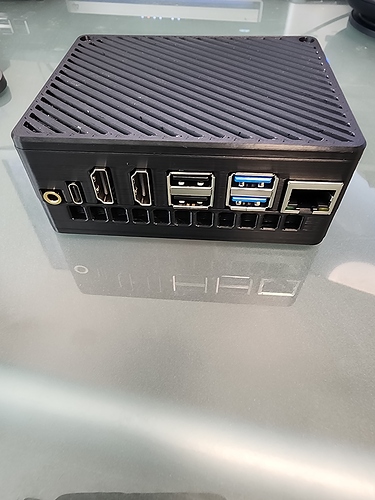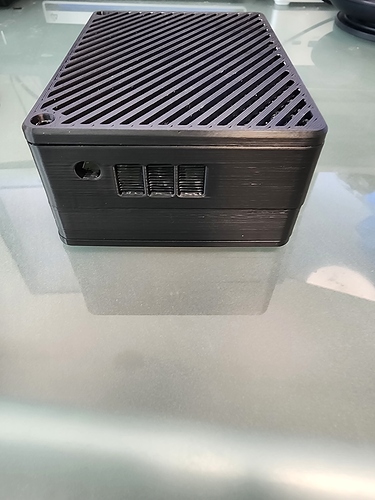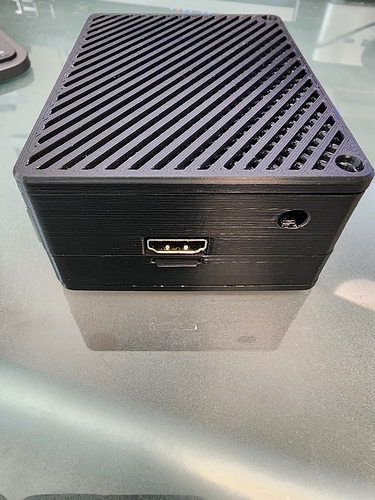Is there a minimum build of Debian 12 in existence (no desktop environment)? I’ve tried for a long time to remove KDE from the github posted build but the various startup scripts keep reinstalling.
Rock 5B+ Debian build
I also prefer cli only builds,
unfortunately right now radxa builds only kde variant (that is easy to strip down from GUI)
You may be interested in Armbian build system and build whatever You need - including super minimal image.
Hi dominik, my linux skills are pretty limited. I’ve tried deleting/removing/purging the KDE GUI code. There appears to be some boot code that simply re-installs everything so nothing stays uninstalled. I’ve used Armbian recently on a Nanopi build, with success. I don’t think the 5B+ is supported yet…unless using the 5B build will work. I suppose I could just try it and see. I need to dump all the GUI stuff since OpenMediaVault won’t install with any desktop installed. Thank you for your insight.
There is build designed just for OMV7 for ROCK 5B boards by @wong_disable
more on this thread: [Image] - OMV7 for Rock 5B with ZFS v0.2
5B+ is not much different board than 5B, only few small differences so You can boot with any of them, no worries.
To remove GUI on radxa image simply go to rsetup and select boot target from gui, restart.
then just purge gui packages, this should work with something like this:
sudo apt purge --auto-remove libx11-6 libwayland-client0
I don’t have any board at hand now, so package name may be different but it’s quite easy to check, pick any package and check deps, something like firefox.
Ok, I will try some of the other images. I did test Armbian, it kept crashing out, read/write errors…- even though I’m logged in as su. Your code seemed to purge a ton of stuff and now I boot to the cli. However I get certificate errors when I try to install omv. I looked at the omv link in your post and tried the img file referenced - unfortunately winrar is flagging the file as corrupt. Anyhow…I will try the images from the Radxa website and see where that takes me. Thx so much for your help on this.
Some Armbian builds are just broken and same thing sometimes comes with updates. I can’t judge about this particular i/o error, but as always it’s easy to retry on some other image and compare. This can be anything, for sure You will need some time to solve it so choosing easy path can be easier.
Certificate error is not hard to solve. This happens to many images and sometime update comes with fixed gpg key so it’s as easy as temporary update with http or switch to ignore cert errors. Sometime just system time is wrong.
I’m about to give up on the 5B+ I should have checked that the device software was suitable for what I wanted to do - just run OMV. I have tried stripping out KDE. I never get to the point of being able to install omv - the build just keeps crashing. I’ve tried various armbian builds. No luck. I tried to use the OMV build referenced above - the compressed file is corrupt. I have 4 devices from FreindlyElec and they all just work. It’s my own fault, I assumed that Radxa would have the same level of o/s support. My bad. It’s a shame, the specification for the board is great and the KDE interface is very nice, the performance is great. I even designed and 3D printed a nice enclosure. But I just need a std debian build as a base. Freindlyelec don’t have the 2xNVME plus wifi board which is why I went with the 5B+. Oh well, I will see who else has something similar, but with a base debian build.
@wong_disable can You please check if there is anything wrong about this xz archive? Do You plan any update with 6.x kernel?
Have to say that the 5b plus just not production ready. I’ve gone back to look at the yml file to see what packages are installed in the compilation. I’m trying to find a use for this box of tricks. To the best of my limited knowledge the yml has at the front the std packages and at the back all of the kde stuff. Removing all of the latter packages I still get errors about there being a desktop environment.
Keep
packages: [radxa-archive-keyring
vscodium-archive-keyring init initramfs-tools sudo firmware-brcm80211 firmware-realtek
cloud-initramfs-growroot ssh systemd-timesyncd bluetooth iw network-manager
wpasupplicant radxa-firmware radxa-udev rsetup rsetup-config-first-boot firmware-iwlwifi
firmware-linux apt-listchanges apt-transport-https apt-utils bash-completion
bc binutils curl eject exfat-fuse file gpg haveged htop lbzip2 less
locales lm-sensors man-db nano needrestart ntfs-3g python3-pip software-properties-common
tmux vim wget xz-utils efibootmgr systemd-boot avahi-daemon ca-certificates
dnsmasq ldnsutils iproute2 iptables iputils-ping samba wireless-regdb
Remove
vscodium-archive-keyring init initramfs-tools sudo firmware-brcm80211 firmware-realtek
cloud-initramfs-growroot ssh systemd-timesyncd bluetooth iw network-manager
wpasupplicant radxa-firmware radxa-udev rsetup rsetup-config-first-boot firmware-iwlwifi
firmware-linux apt-listchanges apt-transport-https apt-utils bash-completion
bc binutils curl eject exfat-fuse file gpg haveged htop lbzip2 less
locales lm-sensors man-db nano needrestart ntfs-3g python3-pip software-properties-common
tmux vim wget xz-utils efibootmgr systemd-boot avahi-daemon ca-certificates
dnsmasq ldnsutils iproute2 iptables iputils-ping samba wireless-regdb
I think the only hope I would ever have to get a bare-bones build would be to compile a fresh build which is beyond my abilities.
So, I then decided to give up on OpenmediaVault and just find something/anything I could use the box for. I figured an emby server. Again, not happening. Too many errors being kicked out to complete any installation. About the only thing of use to me that I managed to install and get running is docker. But only Cli. No joy with getting a docker GUI inside of KDE.
Compared to other vendors, the OS choices offered by Radxa are very very poor. It truly is a very developer focused platform, not really something a home hobbyist can work with. Other vendors have something like a dozen builds to use including bare-bones. For Radxa, KDE and that’s it. Very poor.
compression corrupted?? ok I will check it, sorry I missed the message.
Yes I planned to update it to 6.x kernel, but no time to research this recently as the NAS is happily running.
Anyways, I just bought another 5B+ with 24G and would start working on it soon.
Interestingly balena etcher did not complained about this file earlier,
in fact when I tried to download and test it now there is something wrong in integrity.
6.x kernel would be great, I think that there is no point for 5.x for new releases.
The major problem for RK3588 would be bifurcation in kernel 6.x, which is currently a no-go.
I’ve seen progress in bifurcation awhile before but seems that there is still works to be done.
I have this board: https://www.friendlyelec.com/index.php?route=product/product&product_id=299
Same chipset I think. RK3588 (not 3588S) Works great with Debian bookworm/omv. Runs v7 of OMV without issue. As for bifurcation, the board has 4xnvme’s installed right now.
They provide an img file for OMV, plus a bunch of other builds such as openwrt. All work fine out of the box.
With more and more boards with splitted m.2 port bifurcation is default option, I briefly checked armbian kernel v6.6 and AFAIR it worked with two ports (not sure about real data transfers).
@jack confirmed about bifurcation working on recent v6.1 official kernels. Have You checked those too?
Sorry bro, I’ve not yet got the time to check these at the moment.
I would be most grateful if you could point me to the pages for my reference 
@Bruce_Costello What problems are you having installing pve? I had no problems using the official pve tutorial after updating my system with rsetup: https://docs.openmediavault.org/en/stable/installation/on_debian.html and following the instructions to configure the network using omv-firstaid. If you don’t want to use the desktop, you can disable it with the command sudo systemctl disable display-manager --now
I’ve tried many combinations to try to get OMV up and running. The only way I have been able to get OMV installed is to build a version of the OS using rbuild on bullseye (not able to get bookworm to finish building with rbuild) with the cli modifier. So, only V6 of OMV is possible. I use rsetup to do an initial update/upgrade, then do the install. Once I get OMV up I find network changes don’t hold and if I change time zone, then the whole system comes down, can’t even login via putty. After a change, rsetup is then unstable and wont run. I’ve tried Radxa’s latest greatest build method to try to get a bookworm build, tried using the various ways they explain on GitHub. Can never get it to finish. Have tried in proxmox vm’s, bare metal, tried in windows, Linux, etc. Even tried to run a build on the 5B+ - the irony there, of course it doesn’t run. I asked support to do a cli bookworm build - after all, all they would need to do would be to run their build with the cli modifier, but they won’t help - “only support desktop versions”. It’s my own fault, I shouldn’t have purchased based off of specifications which look very good. The reality is the OS options and support are very light and stability is questionable. I have a $200 door stop.
Something else…as you may know, if on first boot you go headless, then the OS enables SSH and runs cli. But the desktop apps are all there and OMV finds them and refuses to build. Hence the need to get a build without a desktop environment.
I managed to get a bookworm build to complete with the radxa tool rsdk. The only combination to complete was a clean, bare metal debian build. No desktop selected as part of the debian install, minimal cli only, just ssh. Some additional apt’s were needed beyond the instructions on the website. Thanks to the video to show the install sent through by radxa support I managed to get a bookworm cli build to complete which I then burned and booted with. However, it seems a cli build is not strictly a cli build. OMV will still not load as it senses a desktop environment in the build and in fact the yaml build manifest shows gui elements. rsetup still offers multi-user or graphical. As it stands now I can’t see a route to getting omv to work in a radxa environment - at least not bookworm.
So have you tried the method I mentioned, installing OMV doesn’t require a rebuild of the image, they also support installing from a debian system



